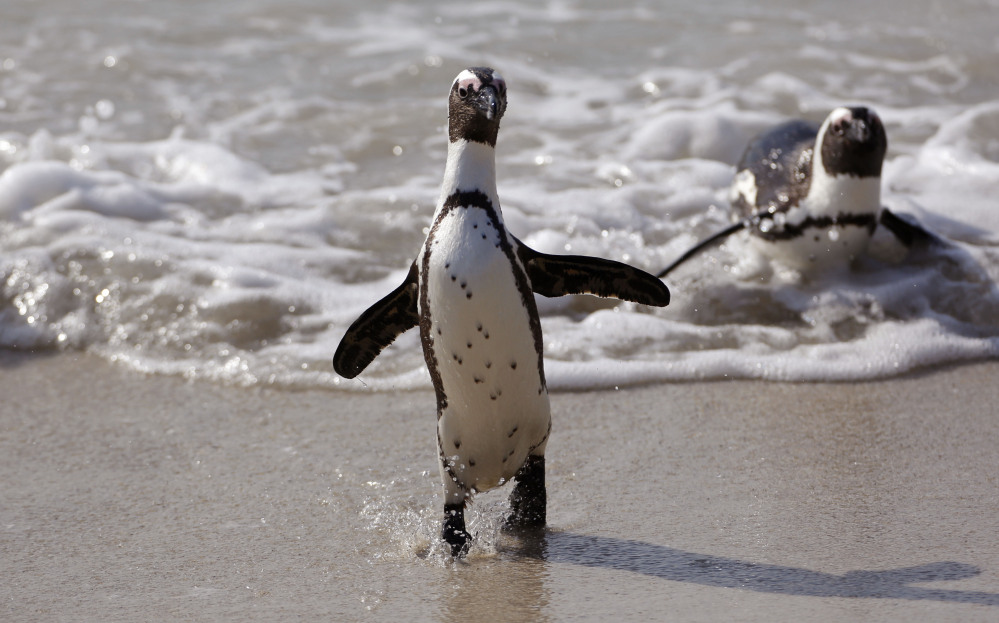CAPE TOWN, South Africa — They’re cute, knee-high, bray like donkeys and are a tourist attraction near Cape Town. But African penguins, the continent’s only species of the flightless bird, are at risk of extinction.
As shoals of anchovies and sardines have migrated south into cooler waters, the population of African penguins that feeds on the fish has plummeted by 90 percent since 2004 along South Africa’s west coast, once the stronghold of Africa’s only penguin species.
This decline, recorded by South Africa’s Department of Environmental Affairs, led to four key fishing grounds being declared off limits seven years ago in an experiment to see if the measure could help
But scientists are still debating whether fishing has helped push the species to the brink of extinction.
The debate has gotten so acrimonious that the Island Closures Task Team, which oversaw the experiment and determined management actions, disbanded last year. Meanwhile, the fishing bans remain in place.
If effective management of the situation is not carried out, the black-and-white seabirds could soon disappear, experts say.
In the 1930s, South Africa’s largest penguin colony had 1 million African penguins, and there were many other colonies. Now, only 100,000 of the birds remain in all of South Africa and neighboring Namibia, the only two countries where the species exists. In 2010, the International Union for Conservation of Nature declared the African penguin endangered.
Of the 17 species of penguins in the world, the IUCN has named four others as endangered: the yellow-eyed penguin and erect-crested penguin from New Zealand, the northern rockhopper penguin from islands in the South Atlantic and Indian Ocean and the Galapagos penguin in Ecuador. Reasons for declines include sea temperature change causing shifts in forage fish, predators, disease, fishing and toxic algae.
Both fisheries scientists and bird specialists agree that the decline of the African penguin began around 2004 with a southern shift in anchovies and sardines away from the hub of colonies along South Africa’s Atlantic coast. Scientists are unsure why the fish have moved, considering as possible causes climate change, overfishing and natural fluctuations.
Now, penguins must swim farther to catch fish, leaving adults weakened. Many have died or abandoned their chicks, with hundreds winding up in the crowded, outdoor pens of a seabird rehabilitation center, nestled on the edge of Cape Town’s Table Bay. It is run by the Southern African Foundation for the Conservation of Coastal Birds, or SANCCOB.
On a recent morning, workers there were feeding and medicating 106 orphans and putting them in pools for a morning swim. In an attempt to slow the decline, SANCCOB releases rehabilitated penguins into the wild every week.
Relocating penguins to within reach of the masses of anchovies and sardines is only a possibility for chicks – and a difficult one with no guarantee of success.
So, in 2008, the South African government began the experimental ban on fishing in a 12.4-mile radius alternating around four key penguin colonies: Robben and Dassen Islands in the Atlantic Ocean and St. Croix and Bird Islands in the Indian Ocean. Some of these waters were hotspots for sardine and anchovy fishing.
Anchovies and sardines comprise, in volume, the biggest component of South Africa’s fishing industry. In terms of revenue, it’s the second-biggest. They are also the penguin’s primary food source.
Fisheries experts blame predators like fur seals and sharks, nest flooding, heat stress or disturbances from large fishing vessels for exacerbating the penguin decline – not fishing itself.
Penguin biologists say it’s too early to tell.
“These sorts of issues must be teased out and the assumptions clearly understood,” said Dr. Rob Crawford, who heads the penguin biologist research. Crawford’s team wants to keep the fishing grounds closed for several more years while fisheries scientists are calling for its end.
The fishing industry, meanwhile, is losing its patience and wants to know whether seven years of closures have amounted to anything.
Send questions/comments to the editors.



Success. Please wait for the page to reload. If the page does not reload within 5 seconds, please refresh the page.
Enter your email and password to access comments.
Hi, to comment on stories you must . This profile is in addition to your subscription and website login.
Already have a commenting profile? .
Invalid username/password.
Please check your email to confirm and complete your registration.
Only subscribers are eligible to post comments. Please subscribe or login first for digital access. Here’s why.
Use the form below to reset your password. When you've submitted your account email, we will send an email with a reset code.